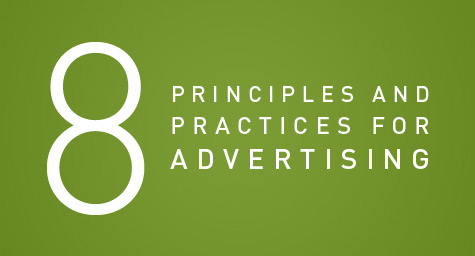Eight Principles Of Advertising Ethics
The explosion of new media, new technologies, and new opportunities is transforming the marketing and advertising landscape and revolutionizing the way the industry conducts business. The only constant is the need for transparency. In response, the Institute for Advertising Ethics (IAE) was created to inspire advertising, public relations and marketing communications professionals to practice the highest personal ethics in the creation and distribution of commercial information to consumers. Administered by the American Advertising Federation (AAF) in partnership with the Reynolds Journalism Institute (RJI) and the Missouri School of Journalism the Institute for Advertising Ethics, the IAE was built upon the following eight principles and practices which convey how all forms of communication should do what is right for consumers, which in turn is right for business.
Principle 1 – Advertising, public relations, marketing communications, news, and editorial all share a common objective of truth and high ethical standards in serving the public. Research shows that consumers place high value in honest and ethical advertising. While the industry has long been committed to the highest standards of truth and accuracy, professionals must further enhance their advertising ethics in order to build and maintain consumer trust.
Principle 2 – Advertising, public relations, and all marketing communications professionals have an obligation to exercise the highest personal ethics in the creation and dissemination of commercial information to consumers. The first mission of the IAE is to educate industry professionals about the importance of truthful, ethical advertising. The goal is to convey their responsibility to demonstrate professionalism at all times.
Principle 3 – Advertisers should clearly distinguish advertising, public relations and corporate communications from news and editorial content and entertainment, both online and offline. As we continue to blur the line between commercial communications and editorial content, consumers are increasingly being misled and treated unethically. To avoid consumer confusion and mistrust, the industry must strive to clearly separate paid advertising from actual news.
Principle 4 – Advertisers should clearly disclose all material conditions, such as payment or receipt of a free product, affecting endorsements in social and traditional channels, as well as the identity of endorsers, all in the interest of full disclosure and transparency. The popularity of social media and word-of-mouth marketing raises questions about the credibility of content. Advertisers must be transparent about whether bloggers are expressing their own opinions or are being compensated by a brand. There must also be full disclosure regarding the authenticity of comments on Facebook, Twitter and other social media platforms.
Principle 5 – Advertisers should treat consumers fairly based on the nature of the audience to whom the ads are directed and the nature of the product or service advertised. Extra care must be used when advertising to children and other vulnerable audiences to avoid misleading or mistreating them. Advertisers should also use discretion based on the nature of the product or service, especially alcohol and prescription drugs.
Principle 6 – Advertisers should never compromise consumers’ personal privacy in marketing communications, and their choices as to whether to participate in providing their information should be transparent and easily made. As marketers develop increasingly advanced means of online behavioral targeting, consumers worry about their privacy. In response to consumer concerns and government warnings, marketing and media trade associations are launching an online self-regulatory initiative to give consumers greater control over the collection and use of online viewing data.
Principle 7 – Advertisers should follow federal, state and local advertising laws, and cooperate with industry self-regulatory programs for the resolution of advertising practices. The Federal Trade Commission, Better Business Bureau and Food & Drug Administration are just a few of the regulatory bodies that advertisers can look to for guidance regarding ethical practices. The advertising industry has also created an exceptional self-regulatory program called the National Advertising Review Council (NARC) that covers both adult and children’s advertising.
Principle 8 – Advertisers and their agencies, and online and offline media, should discuss privately potential ethical concerns, and members of the team creating ads should be given permission to express internally their ethical concerns. Taking the time to discuss and resolve ethical dilemmas is essential to practicing the highest ethical standards. The industry must maintain an open environment where professionals feel free to express their opinions, both positive and negative. The main consideration behind all advertising should be what is best for the consumer, and this will lead to the best plan of action.
The IAE developed these eight principles as an ethical frame of reference for industry professionals. The overwhelming message is that respect for the consumer will result in respect for the industry.
MDG, a full-service Florida advertising agency, with offices in Boca Raton and New York, NY, specializes in developing targeted Internet marketing solutions, exceptional creative executions and solid branding and media buying strategies that give clients a competitive advantage.Our core capabilities include print advertising, branding, logo design, creative, digital marketing, media planning and buying, TV and radio advertising, public relations, Web design and development, email marketing, social media marketing and SEO. View MDG’s creative marketing portfolio.

